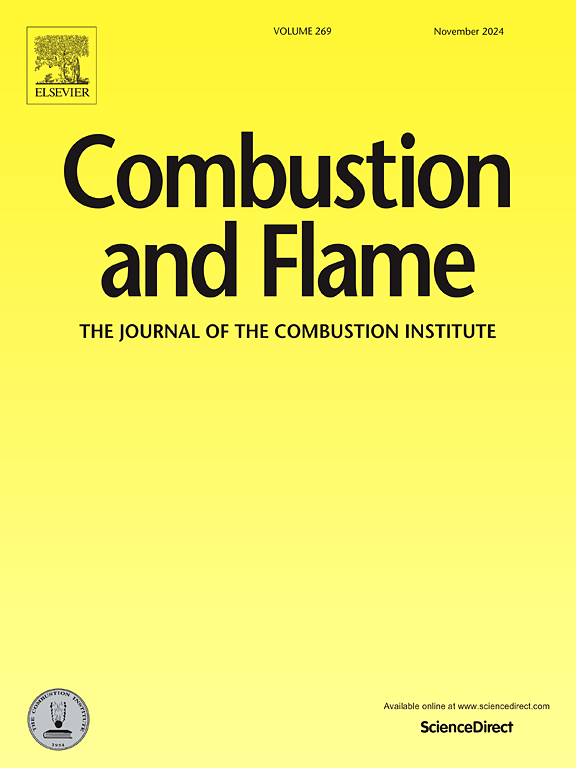Active control of thermoacoustic instability in a lean-premixed hydrogen-enriched combustor via open-loop acoustic forcing
IF 6.2
2区 工程技术
Q2 ENERGY & FUELS
引用次数: 0
Abstract
Open-loop control is proven effective in mitigating self-excited oscillations in conventional hydrocarbon-fueled combustors, but its effectiveness in hydrogen-fueled combustors remains unknown. This study experimentally investigates the effectiveness of open-loop acoustic forcing in mitigating self-excited periodic thermoacoustic oscillations in a lean-premixed, hydrogen-enriched turbulent combustor. We conducted experiments across a range of hydrogen volume fractions (20% to 50%), varying both the frequencies and amplitudes of the acoustic forcing introduced via three loudspeakers positioned upstream of the combustor. For the first time, we have demonstrated the effectiveness of open-loop acoustic forcing in mitigating self-excited periodic thermoacoustic oscillations in a hydrogen-enriched combustor, with suppression effects becoming more pronounced as the hydrogen content increases. We achieve up to a 90% reduction in pressure amplitude with minimal energy input—less than 1% of the combustor’s thermal power. At lower hydrogen fractions, the acoustic forcing fails to effectively decouple the flame dynamics from the acoustic field, resulting in significant oscillation amplification, with natural mode amplitudes increasing by over 2000%. A critical transition from global amplification to suppression occurs at a hydrogen volume fraction of 40%, where successful decoupling between the flame dynamics from the acoustic field is observed. These findings highlight the potential of open-loop control for mitigating thermoacoustic oscillations in hydrogen-enriched combustion systems, offering a promising approach to aid the decarbonization of gas turbines.
Novelty and significance statement
This study provides the first experimental evidence that open-loop acoustic forcing can effectively suppress thermoacoustic oscillations in hydrogen-enriched turbulent combustors. We show that increasing hydrogen volume fraction (20% to 50%) in the reactant mixtures enhances oscillation suppression, achieving up to a 90% reduction in pressure oscillation amplitude with minimal energy input (less than 1% of thermal power). A critical transition from oscillation amplification to suppression occurs at a hydrogen volume fraction of 40%, highlighting a threshold where decoupling between flame dynamics and the acoustic field becomes effective. These findings demonstrate the potential of open-loop control for stable operation in future hydrogen-enriched gas turbines.
利用开环声强迫主动控制贫预混富氢燃烧室热声不稳定性
开环控制在传统碳氢燃料燃烧器中被证明是有效的,但其在氢燃料燃烧器中的有效性尚不清楚。实验研究了开环声强迫在稀预混富氢湍流燃烧室中减轻自激周期性热声振荡的有效性。我们在氢气体积分数(20%至50%)范围内进行了实验,通过位于燃烧室上游的三个扬声器,改变了声强迫的频率和振幅。我们首次证明了开环声强迫在减轻富氢燃烧室自激周期性热声振荡方面的有效性,随着氢含量的增加,抑制效果变得更加明显。我们以最小的能量输入(不到燃烧室热功率的1%)实现了高达90%的压力幅度降低。在较低的氢组分下,声强迫不能有效地将火焰动力学与声场解耦,导致显著的振荡放大,自然模态振幅增加超过2000%。当氢体积分数为40%时,火焰动力学与声场之间的成功解耦发生了从全局放大到抑制的关键转变。这些发现突出了开环控制在减轻富氢燃烧系统中的热声振荡方面的潜力,为帮助燃气轮机脱碳提供了一种有前途的方法。新颖性和意义声明本研究首次提供了开环声强迫能够有效抑制富氢湍流燃烧室热声振荡的实验证据。研究表明,增加反应物混合物中氢的体积分数(20%至50%)可以增强振荡抑制,以最小的能量输入(小于1%的热功率)实现高达90%的压力振荡幅度降低。当氢体积分数为40%时,从振荡放大到抑制的临界转变发生,突出了火焰动力学和声场之间的解耦变得有效的阈值。这些发现证明了开环控制在未来富氢燃气轮机稳定运行中的潜力。
本文章由计算机程序翻译,如有差异,请以英文原文为准。
求助全文
约1分钟内获得全文
求助全文
来源期刊

Combustion and Flame
工程技术-工程:化工
CiteScore
9.50
自引率
20.50%
发文量
631
审稿时长
3.8 months
期刊介绍:
The mission of the journal is to publish high quality work from experimental, theoretical, and computational investigations on the fundamentals of combustion phenomena and closely allied matters. While submissions in all pertinent areas are welcomed, past and recent focus of the journal has been on:
Development and validation of reaction kinetics, reduction of reaction mechanisms and modeling of combustion systems, including:
Conventional, alternative and surrogate fuels;
Pollutants;
Particulate and aerosol formation and abatement;
Heterogeneous processes.
Experimental, theoretical, and computational studies of laminar and turbulent combustion phenomena, including:
Premixed and non-premixed flames;
Ignition and extinction phenomena;
Flame propagation;
Flame structure;
Instabilities and swirl;
Flame spread;
Multi-phase reactants.
Advances in diagnostic and computational methods in combustion, including:
Measurement and simulation of scalar and vector properties;
Novel techniques;
State-of-the art applications.
Fundamental investigations of combustion technologies and systems, including:
Internal combustion engines;
Gas turbines;
Small- and large-scale stationary combustion and power generation;
Catalytic combustion;
Combustion synthesis;
Combustion under extreme conditions;
New concepts.
 求助内容:
求助内容: 应助结果提醒方式:
应助结果提醒方式:


